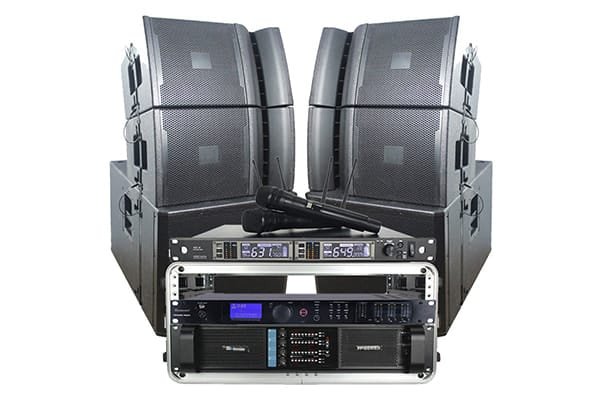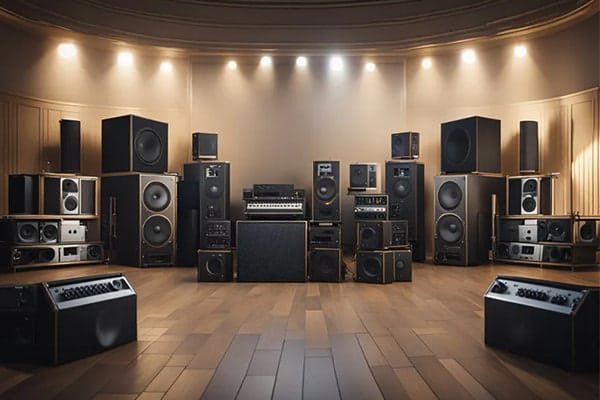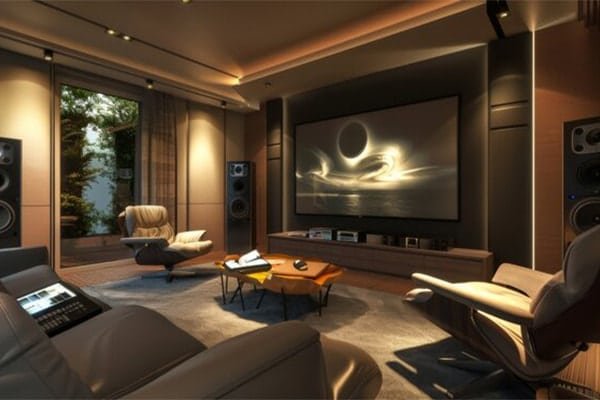Concept of a Professional Sound System
A professional sound system can be simply understood as a collection of audio equipment connected together to create a cohesive network. Its purpose is to express, transmit, and communicate to individuals, organizations, or groups. This sound system includes essential components such as speakers, amplifiers, microphones, converters, and timers.

Components of a Professional Sound System
A professional sound system comprises devices such as mixers, power amplifiers, speakers, microphones, and audio processing equipment. These devices are often housed in special enclosures to protect and optimize performance.
- Mixer: This device controls the audio, allowing the operator to blend different sound sources, such as microphones, musical instruments, or songs from playback devices.
- Power Amplifier: This device enhances and distributes audio from the mixer to the speakers, improving sound quality.
- Speakers: The most critical component of a professional sound system, speakers are designed to produce clear and powerful sound. They can be positioned in various locations within a space to ensure even sound distribution and can vary in size and power to meet specific event requirements.
- Microphone: This audio input device transmits voice or music from the performer to the mixer. There are several types of microphones, including handheld, headset, and wireless microphones.
- Audio Processing Equipment: Devices like compressors, equalizers, reverbs, and delays improve sound quality, reduce noise, and enhance audio performance.

Advantages of a Professional Sound System
- High Sound Quality: Designed to meet high audio quality standards, the devices used in these systems ensure clear and powerful sound.
- Good Performance: Tailored for optimal performance in live music events, conferences, sports events, and other applications.
- High Reliability: Professional sound systems are built for reliability, with devices and software rigorously tested to ensure stable operation and avoid unwanted malfunctions during use.
- Flexible Sound Adjustment: Equipped with audio processing tools such as equalizers, compressors, reverbs, and delays to fine-tune the sound for specific event requirements.

===> Learn more: What is Data Center Cabling? What’s Inside a Data Center?
Disadvantages of a Professional Sound System
- High Initial Investment Cost: Setting up a professional sound system often requires a significant initial investment, as professional equipment and software tend to be more expensive than standard devices.
- Complex Usage: Operating a professional sound system necessitates technical knowledge and experience for proper setup and operation, making it challenging for beginners.
- Space Requirements: These systems typically require substantial space to install speakers, especially for large events, which can complicate the transport and operation of the equipment.

How Sound System Works?
Function of Microphones in a Professional Sound System
Microphones transmit urgent sounds and content, such as emergency meeting announcements, assembly orders, or pre-written bulletins. The microphones used in announcement sound systems can be tabletop, wireless, or wired.
Features of Peripheral Devices in Announcement Sound Systems
Peripheral devices may include desk phones, music players, computers, and VCD players. These devices can be considered the content that needs to be transmitted as announcements. They connect directly to the central control unit or amplifier to provide announcement content to the system.

Functions of Central Control Units and Amplifiers in Professional Systems
Central control units and amplifiers serve similar functions; they decode audio and amplify the content to output through speakers. Typically, the central control unit accompanies the amplifier in complex professional sound systems that need to connect with various peripheral devices. In simpler announcement sound systems, the amplifier can effectively fulfill this role.
Features of Speakers in a Sound System
Speakers are the terminal devices in an audio setup. After all the processes of signal reception and decoding, the content is transmitted through the speakers. Speakers used in sound systems may include ceiling speakers, column speakers, or loudspeakers, with the type selected largely depending on the terrain of the installation site.
Applications of Professional Sound Systems
In practice, sound systems have significant applications for public purposes, fostering collective spirit, discipline, and community awareness. The role of sound is indispensable in companies with extensive layouts, particularly in industrial zones. Announcement sound systems are also utilized in public institutions such as schools, hospitals, military bases, police departments, and neighborhood organizations.

If you need to install a professional sound system for your organization, business, school, or other locations, please leave your information or contact NT Security directly for consultation, pricing, and installation services.

